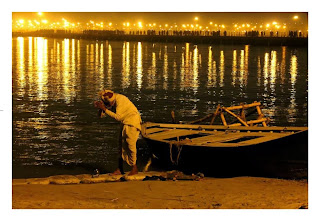It could go
down to may be 10 degrees. At night could be a bit lower. Mornings were all
foggy, really foggy. Then as the day progressed, there was a sweet sun. Just
about the right amount of warmth that you need in the winter days. After a
hearty lunch, which would typically include all seasonal vegetables, like the
cabbage with green peas or the cauliflower with potatoes, the fish with
cauliflower, etc. it was time to sit in the garden, back to the sun, and eat
oranges.
A
simplified world where food was seasonal, recreation was seasonal, activities were
seasonal.
One other important seasonal ritual was to make sure you were prepared for the cold nights, as the houses in our part of the world are never fit for any season. Therefore, you would put your pillows (cotton filled), your quilt (also cotton filled) on the sun for those to be warm and cosy for your night. I am really not in a position to scientifically validate this act of putting pillows and duvets in sun resulting in warmer nights, but I can surely validate the emotional comfort the activity offered. Also important was the seasonal activity of ‘tula dhuna’. There is no way I could find an English translation of it. But what it means literally is that you take out cotton from the quilt or the pillow and fluff it using a machine that is manually operated, on your courtyard by a man (yes it was always a man) by invitation and pay him an amount for re-fluffing the cotton and making it ready to be woven into the pillow or the duvet. His instruments were typical a bow string, a very big one, and a mace to beat the string at regular intervals to let the cotton loose.
It made a typical sound – the action of fluffing the cotton, with the winter sun on your back, the taste of orange in your mouth, catching your cousin or friend off guard and squeezing the orange peel juices in their eyes and running as fast as you could and early sunsets were all memories of my simplified world. Then as the evenings grew longer, sometimes we would put burning coals in earthen wares and have make-shift heaters to be passed on from one another. We were always wearing sweaters and socks inside the house and often put a blanket on the mosquito net to protect from the cold sneaking in from the bamboo thatched walls of the rooms. And then as night fell, from far away you would hear the sifting sounds of kirtan (religious songs in praise of Lord Krishna)- and that was your lullaby to drift into the world of dreams on your freshly fluffed, sun-bathed pillows and duvets.
I can still
smell those sun-bathed pillows with a tinge of orange in the air.
Fluffing cotton
is a disappearing handicraft. I wonder what the ones who had fluffing cotton as
their profession have transitioned to today.
Fresh oranges
from nearby orchards are disappearing seasonal fruits today. We do not have to
wait anymore, patiently, for the season to come, to taste the oranges. How they
were never that sweet at the start of the season, and grew sweeter and juicier as
the season progressed, we cannot show that to our children anymore. Supermarkets
sell mangoes when it is 1 degree outside.
Kirtans we
do not get to hear anymore, forget where I live today, not sure if they still are
performed where I was born and passed those simple winters.
Winters are
very complex today. In a complex want and drive to socialize, we buy gadgets.
Gadgets to slide on snow (read ski or ice skating), gadgets to walk on snow. We
book ski lessons, we book candle-light racket walks in snow. We eat food that
we eat all through the year. We find electric room heaters, and when the
electric bills go up, we blame the heaters. We do not greedily watch the Mote
Carlo sweaters advertised on good looking men on television anymore, we in fact
own a few of those, but somehow the warmth from the hand-knitted sweater from
the mother or the aunt under the sun still feels more real and comforting.
Memories
are sneaky in nature. You do not know how and when what is etched in your
memory. And you do not predict when they will sneak into your today’s
consciousness. Are memories beautiful because we cannot repeat them anymore? My
son has a tendency. He always wants to repeat a happy experience. Whether it is
eating something a certain way or whether it is a hotel he liked. He wants to
repeat the experience. Is memory memorable simply because it was repeatable?
For me, I think my memory of those winters is beautiful, because they were
simple.





